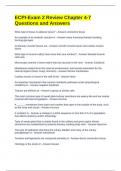-
1. Exam (elaborations) - A&p ch. 4-5 review ecpi exam questions and answers
-
2. Exam (elaborations) - A&p i final exam – ecpi questions and answers
-
3. Exam (elaborations) - A&p unit 1 ecpi exam questions and answers
-
4. Exam (elaborations) - Anatomy and physiology 2 exam 4 ecpi questions and answers
-
5. Exam (elaborations) - Bio 112 anatomy and physiology ecpi exam questions and answers
-
6. Exam (elaborations) - Cardiac chapter 18-test 1 ecpi exam questions and answers
-
7. Exam (elaborations) - Dosage ecpi 2024 review 1 exam questions and answers
-
8. Exam (elaborations) - Ecpi 111 bio final exam questions and answers
-
9. Exam (elaborations) - Ecpi nur165 ch1, 2, 3, 7 exam questions with correct answers
-
10. Exam (elaborations) - Ecpi nur164 ch 2 theory, research exam questions with correct answers
-
11. Exam (elaborations) - Ecpi nur 166 ch 13-18 exam questions with latest update
-
12. Exam (elaborations) - Ecpi midterm final exam study guide questions with complete answers
-
13. Exam (elaborations) - Ecpi human anatomy and physiology 1 final exam questions with latest update
-
14. Exam (elaborations) - Ecpi health assessment quiz 1 questions and answers
-
15. Exam (elaborations) - Ecpi health assessment final exam questions with correct answers
-
16. Exam (elaborations) - Ecpi exam study guide questions and answers
-
17. Exam (elaborations) - Ecpi exam 3 (ch 6-9) a&p questions and answers
-
18. Exam (elaborations) - Ecpi essentials of nursing practice exam questions and answers
-
19. Exam (elaborations) - Ecpi cor test 1 questions and answers
-
20. Exam (elaborations) - Ecpi concepts 1 ch1-3 exam questions with latest update
-
21. Exam (elaborations) - Ecpi ch8-11 exam questions and answers
-
22. Exam (elaborations) - Ecpi bio 116 a&p 2 final review chapters 14 -17 19- 24 exam questions with complete a...
-
23. Exam (elaborations) - Ecpi anatomy physiology exam questions and answers latest update
-
24. Exam (elaborations) - Ecpi anatomy & physiology final exam questions and answers
-
25. Exam (elaborations) - Ecpi anatomy & physiology exam unit 3 (ch. 8-11) exam questions and answers
-
26. Exam (elaborations) - Ecpi anatomy & physiology exam: chapters 1-3 exam questions and answers
-
27. Exam (elaborations) - Ecpi a&p chapter 12 exam questions and answers
-
28. Exam (elaborations) - Ecpi a&p ch.1-3 questions with latest update
-
29. Exam (elaborations) - Ecpi a&p 111 exam questions and answers
-
30. Exam (elaborations) - Ecpi 2024 pathophysiology exam 2 study guide chapter 6, 12, 16 questions and answers
-
31. Exam (elaborations) - Ecpi 2024 cor 195 chapter 1 & 2 exam questions and answers
-
32. Exam (elaborations) - Ecpi 2020 cor 195 chapter 1 exam questions and answers
-
33. Exam (elaborations) - Ecpi nursing a&p2 chapter 20-22 exam questions and answers
-
34. Exam (elaborations) - Ecpi pathophysiology exam 4 questions with correct answers
-
35. Exam (elaborations) - Ecpi pathophysiology exam 4 review questions and answers
-
36. Exam (elaborations) - Ecpi pathophysiology final exam review questions with complete solutions
-
37. Exam (elaborations) - Ecpi pharm final exam questions and answers
-
38. Exam (elaborations) - Ecpi pharm final exam questions with correct answers
-
39. Exam (elaborations) - Ecpi pharmacology exam 1 questions with complete answers
-
40. Exam (elaborations) - Ecpi pharmacology exam 3 questions with complete answers
-
41. Exam (elaborations) - Ecpi pharmacology final exam questions and answers
-
42. Exam (elaborations) - Ecpi unit 4 exam questions and answers
-
43. Exam (elaborations) - Ecpi university - online orientation exam questions and answers
-
44. Exam (elaborations) - Ecpi-exam 2 review chapter 4-7 questions and answers
-
45. Exam (elaborations) - Endocrine chapter 36 ecpi exam questions and answers
-
46. Exam (elaborations) - Exam 2 - pathophysiology ecpi - chapter 5 questions and answers
-
47. Exam (elaborations) - Final exam fundamentals # 3 questions with correct answers
-
48. Exam (elaborations) - Mental health notes ecpi exam questions and answers
-
49. Exam (elaborations) - A male nurse is preparing to take vital signs of a female client. which ethnic group ...
-
50. Exam (elaborations) - Nur 164 final ecpi exam questions and answers
-
51. Exam (elaborations) - Nur234 ecpi exam 1 mh questions with latest update
-
52. Exam (elaborations) - Pathophysiology final exam questions and answers
-
53. Exam (elaborations) - Pharmacology test 1 (ecpi) exam questions and answers
-
54. Exam (elaborations) - Practical ii bio116 ecpi questions and answers
-
55. Exam (elaborations) - Review exam 1, ch 1-3 bio 111 ecpi a&p questions and answers
-
Show more




